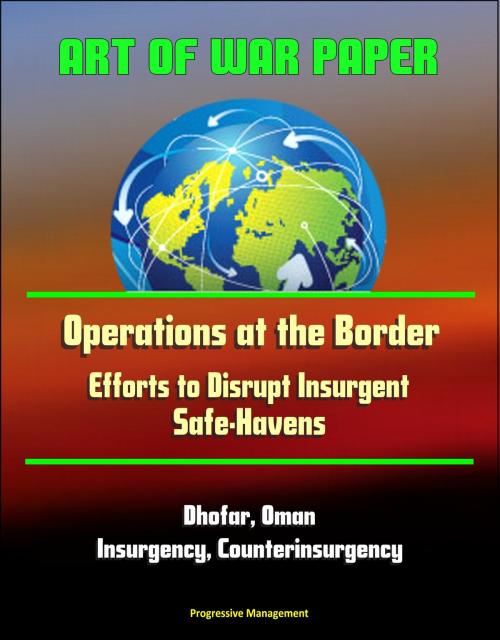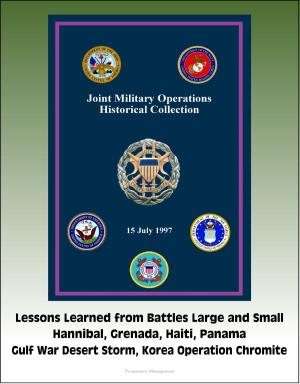Art of War Paper: Operations at the Border - Efforts to Disrupt Insurgent Safe-Havens, Dhofar, Oman, Insurgency, Counterinsurgency
Nonfiction, History, Military, Strategy| Author: | Progressive Management | ISBN: | 9781310178269 |
| Publisher: | Progressive Management | Publication: | April 9, 2014 |
| Imprint: | Smashwords Edition | Language: | English |
| Author: | Progressive Management |
| ISBN: | 9781310178269 |
| Publisher: | Progressive Management |
| Publication: | April 9, 2014 |
| Imprint: | Smashwords Edition |
| Language: | English |
Disrupting an insurgent's access to sanctuary and safe-haven is a critical aspect of operational planning for counterinsurgent forces. By denying an insurgent's access to safe-havens early in the conflict, the counterinsurgent will gain a marked advantage over the initially weaker force. Only through a deep understanding of how the insurgent is using international, tribal, or cultural borders to evade the counterinsurgent force can the counterinsurgent disrupt the insurgent operations. In order to accomplish this, the counterinsurgent must understand the physical terrain and cultural demographics, nest border operations into the overarching strategy, and employ security forces to reinforce success. Through the examination of the British experience in the North-West Frontier, 1849-1947 and the counterinsurgent efforts in the Sultanate of Oman's Dhofar Rebellion, 1962-1975, one can develop techniques for applying border control operations to disrupt insurgent safe-havens. Border control efforts are not the decisive effort within a counterinsurgency, but they are critical to defeating the insurgent's ability to maintain their ability to conduct operations.
Ever since the United States military entered a state of protracted conflict following the attacks by Al Qaeda in 2001, the study of counterinsurgency and limited war theory has come to the forefront of military thought. US military personnel reexamined theories of how to conduct counterinsurgency operations written in the 1950s and 1960s by British and French practitioners operating in Malaya, Algeria, and Vietnam. One of the ideas addressed in these writings was the denial of external support to an insurgent group. David Galula's seminal work Counterinsurgency Warfare: Theory and Practice, published in 1964, noted the importance of isolating an insurgency from its outside support to weaken an insurgent's material, political, and financial support.
The US Army Field Manual 3-24 Counterinsurgency, published in 2006, further reinforces this idea by stating, "access to external resources and sanctuaries has always influenced the effectiveness of insurgencies."
At the start of an insurgency, the counterinsurgent force, whether the host-nation or an interventionist power, has a distinct advantage over the insurgents. The counterinsurgent has the resources, bureaucracy, and institutions of a nation-state, while an insurgency is struggling to amass assets, control a population base, and build a capability to match the counterinsurgent. This initial weakness on the insurgent's part makes the insurgent dependent on outside support during the conflict for funding, equipment, and moral support. If the counterinsurgent force can focus its efforts to isolate the insurgent force from accessing their external support, the counterinsurgent force may be able to contain an insurgency during its early stages.
Contents: Chapter 1 - Introduction * Chapter 2 - What Is Insurgency? * Chapter 3 - Border Operations and Counterinsurgency * Chapter 4 - Case Study: The North-West Frontier * Chapter 5 - Case Study: The Dhofar Campaign, Oman
Disrupting an insurgent's access to sanctuary and safe-haven is a critical aspect of operational planning for counterinsurgent forces. By denying an insurgent's access to safe-havens early in the conflict, the counterinsurgent will gain a marked advantage over the initially weaker force. Only through a deep understanding of how the insurgent is using international, tribal, or cultural borders to evade the counterinsurgent force can the counterinsurgent disrupt the insurgent operations. In order to accomplish this, the counterinsurgent must understand the physical terrain and cultural demographics, nest border operations into the overarching strategy, and employ security forces to reinforce success. Through the examination of the British experience in the North-West Frontier, 1849-1947 and the counterinsurgent efforts in the Sultanate of Oman's Dhofar Rebellion, 1962-1975, one can develop techniques for applying border control operations to disrupt insurgent safe-havens. Border control efforts are not the decisive effort within a counterinsurgency, but they are critical to defeating the insurgent's ability to maintain their ability to conduct operations.
Ever since the United States military entered a state of protracted conflict following the attacks by Al Qaeda in 2001, the study of counterinsurgency and limited war theory has come to the forefront of military thought. US military personnel reexamined theories of how to conduct counterinsurgency operations written in the 1950s and 1960s by British and French practitioners operating in Malaya, Algeria, and Vietnam. One of the ideas addressed in these writings was the denial of external support to an insurgent group. David Galula's seminal work Counterinsurgency Warfare: Theory and Practice, published in 1964, noted the importance of isolating an insurgency from its outside support to weaken an insurgent's material, political, and financial support.
The US Army Field Manual 3-24 Counterinsurgency, published in 2006, further reinforces this idea by stating, "access to external resources and sanctuaries has always influenced the effectiveness of insurgencies."
At the start of an insurgency, the counterinsurgent force, whether the host-nation or an interventionist power, has a distinct advantage over the insurgents. The counterinsurgent has the resources, bureaucracy, and institutions of a nation-state, while an insurgency is struggling to amass assets, control a population base, and build a capability to match the counterinsurgent. This initial weakness on the insurgent's part makes the insurgent dependent on outside support during the conflict for funding, equipment, and moral support. If the counterinsurgent force can focus its efforts to isolate the insurgent force from accessing their external support, the counterinsurgent force may be able to contain an insurgency during its early stages.
Contents: Chapter 1 - Introduction * Chapter 2 - What Is Insurgency? * Chapter 3 - Border Operations and Counterinsurgency * Chapter 4 - Case Study: The North-West Frontier * Chapter 5 - Case Study: The Dhofar Campaign, Oman















